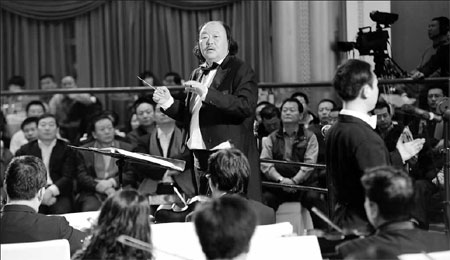 |
|
Ulaantug leads the symphony orchestra from the Inner Mongolia Nationality Music and Dance Opera Troupe to introduce the music from grassland. Zhang Ling / Xinhua
|
Ulaantug is the musician behind some of the most iconic music about the grasslands of Inner Mongolia. He tells Wang Kaihao and Yang Fang in Hohhot, why he is passionate about taking ethnic Mongolian music to the wider world.
He has scruffy hair and is dressed casually in shorts.
It is hard to believe this man from the Mongolian ethnic group who cares little about his appearance is the person behind so many widely loved pieces of music about grasslands.
There might be some people living in the Inner Mongolia autonomous region who have never heard the name Ulaantug, but it would be difficult to find someone unfamiliar with the mesmerizing rhythm of The Great Hulunbuir Grassland, which venerates the remarkable landscapes in the region covering vast areas of northeastern Inner Mongolia and recalls the locals' collective memory of their homeland.
Ulaantug, 55, was born to a musical family from Hailar, deep in Hulunbuir. He feels a strong emotional attachment to this green land.
"I am only a shepherd of music," he jokes. "The most important thing is to spread my music widely among the public. It is extremely exciting when I wander around the grassland and find herdsmen are singing my songs."
In 1999, Ulaantug cooperated with Xi Murong, an ethnically Mongolian poet from Taiwan, to create one of his most renowned pieces, Father's Grassland, Mother's River. It swept folk music circles overnight via 2000's CCTV Spring Festival Gala and has now become a staple sung at Inner Mongolia banquets.
"They will not think of me but always connect their own memories of grasslands to the scores," he says. "Some may sing well, and some may not. But I don't feel any difference because these are their personal feelings. That is what music is created for.
"Thinking weighs more than creativity. My music is the channel shedding the emotion, and writing scores will thus be easy. But the expression of affection cannot be overdone. It comes from nature, and it should be natural."
We recommend:
